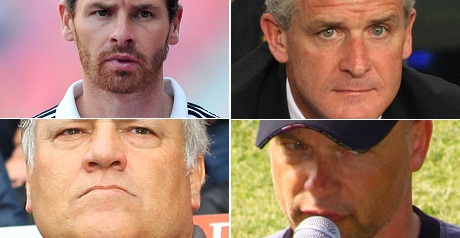All in the mind
Halting a bad run of results is one of the biggest challenges a team can face – as all four west London sides know only too well.
QPR are heading back to the Championship unless they can reverse their decline, while Chelsea’s weekend win over Bolton eased the pressure on Andre Villas-Boas – for now at least – following a run of five matches without a victory.
Fulham enjoyed their derby triumph last Saturday but are notoriously dismal on the road. And playing at Loftus Road has become a problem for QPR, whose loss against the Whites was their seventh home league defeat of the season.
“It’s important to replace these negative pictures and ask the player what it will look like when they succeed.”
Brentford faced a similar problem until recently. They have emphatically ended a terrible run in which their home form undermined their play-off bid.
These type of losing runs lead players to “rehearse failure” according to Dan Abrahams, a sports psychology expert who has worked with a number of top players and clubs.
He says several approaches can be used to turn the corner when pressure is high and confidence is low.
“It’s about trying to create certainty in players,” Abrahams told West London Sport.
“I use an analogy of players having two tattoos, one on their forehead saying ‘Give me certainty’ and the other is by their heart and says ‘Make me feel great’.
“To achieve both those things they need tactical certainty to help them know exactly what they need to do when they go out on to the pitch.
“The other aspect, especially when you’re talking about players struggling for confidence, involves continually working with them and leaving no stone unturned in order to remind them what they’re capable of. It’s not rocket science.
“If during a season a player loses confidence or results go against them, they think about it constantly and the brain can work in such a way that they basically rehearse failure. They need to reverse this and go back to rehearsing success.”
This especially applies when a team is particularly struggling at home or away.
In the case of some clubs – including Fulham – poor away results can span a number of seasons and almost become accepted as the norm.
According to Abrahams: “When that happens it becomes the language of the changing room. It’s not just fans or the media that talk about these things – the players do it as well.

“So the language in the changing room focuses on the problem. People are talking about the problem of not winning at home, or saying ‘we can’t buy an away win’ – things like that.
“There are several ways overcome to this. One of them is to have what’s called an appreciative inquiry, where instead of talking about the problem the group talk about what they’re capable of doing well.
“In that situation the discussion might be ‘What are we good at?’ or ‘What do we do well?’ or perhaps ‘What do we do when we go away that we’re not doing at home’?
“It’s important to change the language in a dressing room. Words are very powerful, especially when it comes to sportsmen and women.
“So too are [mental] pictures, in that when players and teams are struggling they picture themselves like this and dwell on it.
“It’s important in that situation to replace these negative pictures and ask the player what it will look like when they succeed, what it’ll feel like and what they’ll do.”
A former professional golfer, the Twickenham-based Abrahams advocates the use of so-called ‘toothbrush exercises’ – a term coined by leading golf coach Peter Cowen.
“The idea is that you wouldn’t leave the house without brushing your teeth or doing certain everyday things, and the same can be applied to sport,” Abrahams explained.
The technique can be particularly useful for helping strikers going through the kind of barren run Chelsea’s Fernando Torres has been suffering.
Abrahams has worked with the likes of Carlton Cole and Anthony Stokes, both of whom were struggling in front of goal when they sought advice.
Cole went on to play for England and Stokes for Celtic, perhaps underlining the impact the mind can have on a player’s form.
“Carlton is an example of someone I worked with who had been rehearsing failure and we then rehearsed success,” Abrahams said.
“When you have a striker who isn’t scoring goals – and Torres is a prime example – all people talk about is goals, and this contributes to the player’s negative thinking.

“In that situation my approach is to take scoring completely out of the picture. When I first started working with Carlton he was under pressure to score goals from everyone, including himself.
“Everyone says to a striker ‘You’ve got to score goals, you’ve got to score goals’. Well my mum could tell them that.
“What I say is to forget about scoring goals and make sure they do everything else. They need to focus on every other aspect of being a striker: holding the ball up, pulling away from defenders, finding space in behind – you name it.
“Players tend to shy away from doing these things when they’re low on confidence and again it goes back to the toothbrush theory – there are certain things you ought to do, no matter what, as a matter of course.
“When a striker adopts that mentality they then tend to find that the goals return, rather than when they think of themselves as a certain type of striker, usually a goalscorer, and become fixated on that.
“For example when I worked with Anthony Stokes, his manager at Hibernian wanted more from him but he saw himself as a goalscorer and was dwelling on the fact he hadn’t been scoring.
“A lot of strikers think like this. They define themselves as a goalscorer. I suggested to Anthony that he stopped thinking about scoring and just worked really hard out on the pitch, that he was absolutely relentless, and that in the end the goals would come.
“They did and he went on to have a great season and joined Celtic. I’m sure there were other factors in that but I know Stokesy feels that what we worked on helped him a lot.”
Chelsea could certainly do with Torres returning to form as they look to secure a Champions League place.
And with Brentford chasing a play-off spot and QPR trying to stay in the top flight, it’s sure to be a dramatic end to the season.
Cue clichés about taking each game – all of them cup finals – at a time and winning a ‘mini-league’ at the top or bottom of the table. It’s an approach Abrahams believes has some merit.
“Breaking things down into small segments can be a useful thing to do,” he said.
“For many golfers, for example, 18 holes can seem intimidating and even a top player can feel ‘I’m bound to make a mistake at some stage’.
“In that situation it can help to see the course as three sets of six holes, which can seem much more manageable.
“In football, that means setting tangible goals for a period of games until confidence is restored and the language of the dressing room changes.”
Follow West London Sport on Twitter
Find us on Facebook

